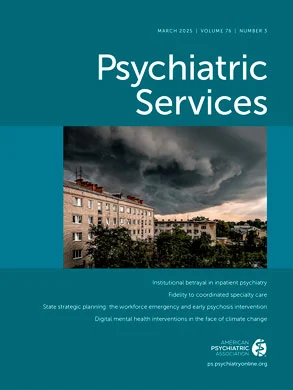To the Editor: For some clinicians and researchers, the word “recovery” is synonymous with the speculative and nonempirical. In the June issue, Windell and colleagues (
1) offered an insightful understanding of the personal meaning of recovery and an excellent discussion of the implications of a study examining the lived experiences of 30 service users during the early phase of treatment of a psychotic disorder.
I recently distributed their article during our regular department seminar, and it led to an interesting discussion about concepts of recovery. We believe it is an appropriate time to establish directions for qualitative studies on recovery from persistent mental illness. First, although it is helpful to study recovery from various mental illnesses, such as early psychosis and bipolar disorder, it is also of paramount importance to collect context-specific, rich descriptions of the experiences of individuals at different stages of their recovery journey, such as individuals who remain psychotic and dangerous (
2) and those who participate in an array of recovery-oriented programs, such as supported employment, Web applications supporting shared decision making in medication clinics (
3), and the strengths models of case management (
4).
Second, because the volume of qualitative studies of mental illness and of experiences of recovery is steadily growing, the next logical step is to estimate how recovery experiences are linked with objectively measured recovery outcomes, such as employment status and the Recovery Assessment Scale (
5), and whether there is a shared recovery trajectory. Currently we use an array of terms—for example, syndromal recovery, functional recovery, and personal recovery—which are often subjectively appraised by an individual to refer to different types of recovery. However, several unanswered questions remain: To what extent do these terms overlap, or do they refer to fundamentally different states? Is experiencing one type of recovery a prerequisite for experiencing another? Is one form of recovery more subjectively meaningful than others, and for whom? On the basis of Windell and colleagues' typology, does the psychological domain of recovery enhance the functional and social domains? How can findings about recovery that have emerged from qualitative and quantitative research paradigms be reconciled? These are epistemologically and clinically important questions.
Third, I used the PubMed database to quickly review qualitative studies published during the past 25 years on recovery from persistent mental illness and found only a dozen or so that examined non-Caucasian, non-English-speaking populations. Thus there is clearly an urgent need to conduct more recovery-related studies of individuals from culturally and linguistically diverse and refugee backgrounds. In particular, studies should examine who holds power in the community to influence conceptualizations of the meaning of recovery and the indigenous treatments (for example, herbal medicine and acupuncture) that individuals use to promote their recovery. One of the potential pitfalls for ongoing research is that the person in recovery may simply become a subject of research and thus lose his or her authenticity as an individual with personal experience of living with mental illness. I therefore believe that a qualitative methodology is essential in recovery-related research.

